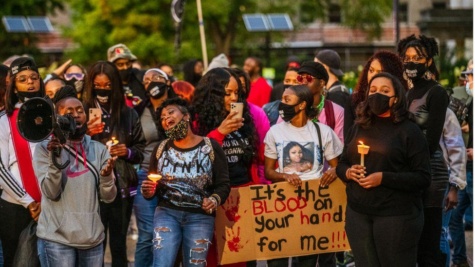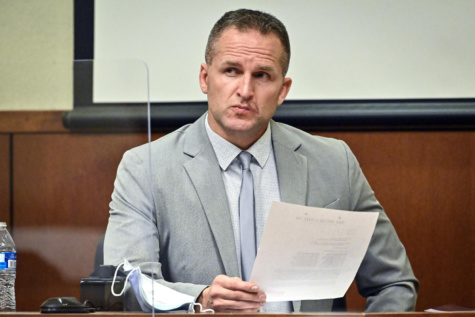
Reaghan Mulligan | Newsroom Manager
March 11, 2022
In March 2020, 26-year-old Breonna Taylor’s house was raided by three police officers under the suspicion that two men were utilizing Taylor’s home to traffic drugs to another location. In response to the officer’s unsuspected search of the house—in the dead of night—Taylor’s boyfriend fired one shot at the men he believed to be intruders threatening their safety, causing an unwarranted, violent reaction from the officers. Throughout the duration of this raid, thirty-two bullets were sporadically fired by the officers, several of these striking and killing Breonna and entering a neighboring apartment.
Taylor’s death fueled the flame of protests across America in early 2020, this event becoming yet another representation of the targeting of black citizens and the lack of accountability to the perpetrators, alongside George Floyd and countless others killed without significant cause.

The only officer brought to court for this event, Brett Hankinson, received a verdict two years after Breonna’s death. Hankinson, who fired ten of the thirty-two shots, was indicted on three counts of wanton endangerment—or the engagement of reckless behavior that manifests in a serious threat of injury or death of another person. The officer’s stray bullets traveled into an apartment next to Taylor’s, where a family of three resided, but luckily did not hit any of them.
After a week-long trial, the court reached a decision: not guilty. Despite the countless errors involving the search and raid, the sole officer taken to court out of the three was let go. However, Hankinson, along with the two others present in the infamous raid were removed from their duties in the aftermath of Taylor’s death.
Ex-Officer Hankinson described his only thoughts in the moment being to protect himself from the “threat”—Taylor’s boyfriend, Kenneth Walker—who fired one shot at the officers under the assumption that they were intruders. The confusion was understandable; the officers used a ‘no-knock warrant’, which allows law officials to enter premises without notifying the residents.
His behavior, however, threatened the livelihood of unsuspecting neighbors, including a five-year-old.
“The issue of police officers violating their power has been arising much more often recently, and it is high time that we resolve this issue now,” senior Psi Padhya said. “I would like to see a ‘check’ on police officers. For the most part, it is the police’s word against the civilians, and in court, for the most part, it is skewed in favor of the police.”
The prosecutors attempted to argue that Hankinson’s conduct was negligent. However, his defense attorney insisted that the situation required quick thinking, thus warranting the officer’s reaction.
Myles Cosgrove, the officer believed to have fired the shot that killed Breonna Taylor, did not testify and has yet to face legal repercussions besides termination from the Louisville Metro Police Department.
“By starting with one officer held accountable, it might eventually lead to change,” junior Cheyenne Hayes said. “I just want there to be justice for everybody who deserves it and for those who have been wronged before.”
In a case involving the wrongful death of an innocent woman and the threat towards numerous lives, the lack of action against these officers speaks volumes for the way police are protected, and in many cases, held above the law. Without accountability, families that suffer from the losses of imprudent reactions—such as the Taylor family—receive no closure and no justice. Breonna Taylor’s death was unnecessary, and the actions taken by the officers that put multiple lives in danger have caused irreparable damage.
“Police officers can easily make mistakes, but civilians have to pay for those mistakes,” Padhya added.

Leave a Reply